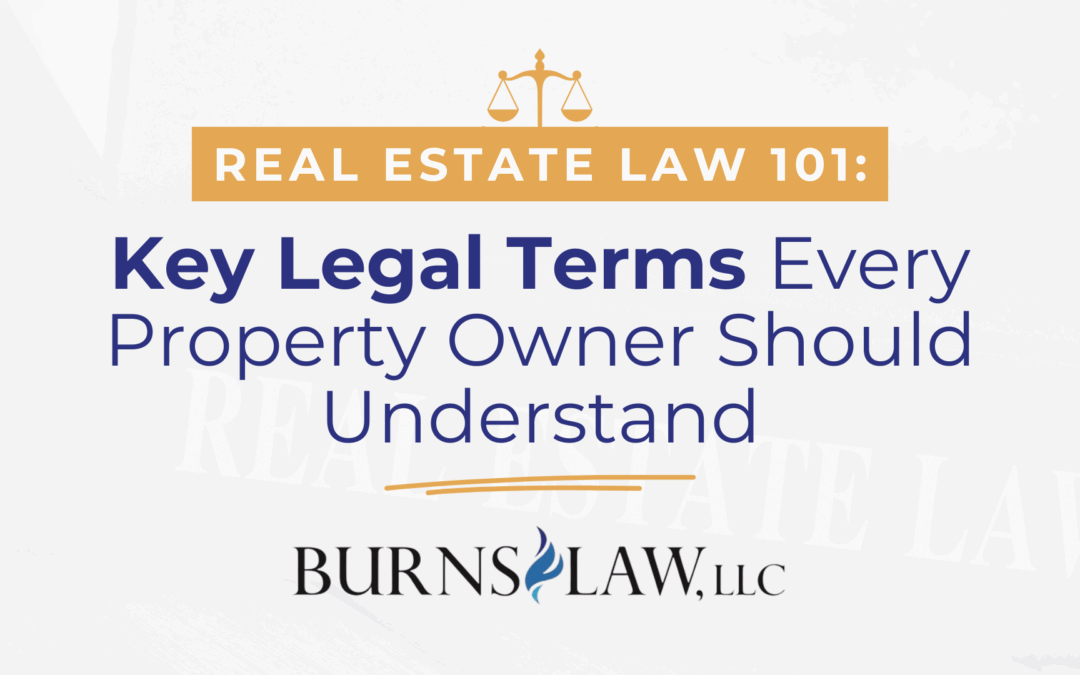It is to no one’s surprise that the real estate realm is filled with jargon. Whether you are reading a contract or meeting with a real estate professional, you are going to be thrown into a world of new words with a quick need to understand them all. It can become overwhelming.
Fortunately, it doesn’t have to be. Burns Law LLC was founded to bring real estate law back down to Earth and ensure that when you meet with us for your real estate needs, you understand everything at every step. That all starts with vocabulary.
Here are some definitions of key legal terms every property owner should understand.
Appraisal / Appraisal Contingency
An appraisal is the process of an appraiser being brought onto the property to determine the value. This will help lenders decide if the property is worth the loan they are considering providing.
An appraisal contingency is a clause set in place that allows a buyer to end a purchase agreement if the property’s appraised value is lower than the sale price.
As-is
As-is is the condition of the property at the time the offer is written. If a property is labeled “as-is,” then it means that it is being sold the way it is, and the owner is not going to perform any changes or repairs to the property.
Covenants, Conditions, and Restrictions (CC&Rs)
Covenants, conditions, and restrictions are the rules and regulations set forth by a developer, builder, homeowner’s association, or neighborhood association.
These rules and regulations usually limit the property owner on what they can do with their property. Additionally, there may be monthly or annual fees.
Closing / Closing Costs
Closing happens when the property sale is considered complete, after all parties have signed the proper documents, lenders have approved, and the tender has been transferred.
Closing fees include fees charged by lenders, title companies, insurance companies, attorneys, real estate agents, homeowner’s associations, and anyone else who might’ve been involved in the process. All of these fees are typically paid at closing.
Days on Market
Days on market indicate the number of days the property has been listed on the real estate broker’s multiple listing service (MLS) to the date when the contract of sale has been signed.
Having a low average of days on the market shows a strong market that will benefit the seller. While a high average of days on market shows a weak market, that will benefit the buyer.
Deed
A deed is a legal document that shows the property ownership transfer from one party to another.
Additionally, there is…
A deed of gift is used while transferring property as a gift.
A deed of lease that outlines the rules and regulations within a lease.
A deed of release is a document that terminates existing property ownership.
A deed of partition that defines property division among multiple parties.
A deed of trust that specifies the transfer of a property title to a third party until the debt is repaid.
Due Diligence
Due diligence is the time period during the purchase agreement when the buyer can examine the property with the help of professionals to help decide how they proceed with the deal.
Easement
An easement is the legal right that allows another party to access or use a portion of your property for specific purposes, such as a utility company running power lines.
Escrow
Escrow is a neutral third-party account that is solely there to hold money, documents, and other assets until the conditions of the sale are met.
Inspection / Inspection Contingency
An inspection happens during the due diligence, where the buyer brings in a licensed inspector to visit the property and report on its condition and possible repair needs.
An inspection contingency, also known as a due diligence contingency, is a clause in the purchase agreement that allows the buyer a predetermined amount of time during escrow to perform any inspections.
Lien
A lien is an official claim against the property, often for unpaid debts to taxes, mortgages, or contractors.
Title / Title Search
A title is the legal ownership of a property. A clear title means there are no liens, disputes, or claims against the property.
A title search is the process of examining public records in order to confirm the property’s legal ownership.
Zoning
Zoning refers to local government ordinances that control how the property can be used, such as whether or not it can be used for residential or commercial purposes.
These are only some of the terms you might come across when in the realm of real estate transactions. If you want to ensure you are stepping into your real estate deal with confidence, partner with a real estate attorney who will omit the jargon and focus on you. Contact the team at Burns Law LLC.

